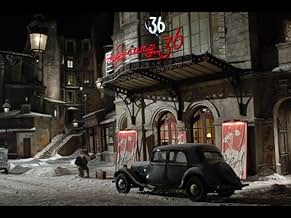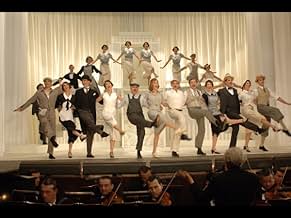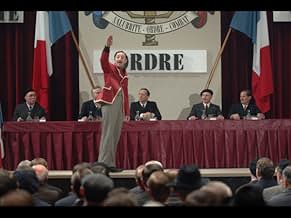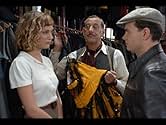When Chansonia, a nightclub, is shut down by the landlord, the stage manager Pigoil is forced to look for a new job. He finds hope when he discovers a young woman with a lovely singing voice... Read allWhen Chansonia, a nightclub, is shut down by the landlord, the stage manager Pigoil is forced to look for a new job. He finds hope when he discovers a young woman with a lovely singing voice.When Chansonia, a nightclub, is shut down by the landlord, the stage manager Pigoil is forced to look for a new job. He finds hope when he discovers a young woman with a lovely singing voice.
- Nominated for 1 Oscar
- 3 wins & 7 nominations total
Featured reviews
This is not a great film, a masterpiece of cinema-as-art. It is, however, a wonderful movie that will delight you while you watch it and leave you with many happy musical memories after it has finished.
Though the director and star are the same, this movie does not resemble Les Choristes. It is, instead, an homage to French popular music of the 1930s (and 1940s). If you don't know that music and the stars who made it famous, you'll miss the many references. The movie will still be enjoyable, but it won't evoke the memories (and pleasures) that it would to French viewers over 60.
The music, most of it original, nevertheless comes very close to pastiche of popular numbers from that era. (One repeated number is very close to Messager's "Clou clou," which I think is from his Véronique.) The performances and characters also allude to stars of the past, though not necessarily in a one-on-one way. There is the music hall singer Tony Rossignol, whose light lyric tenor recalls Tino Rossi, though his Spanish get-up and music recalls Luis Mariano. Kad Merad's character starts out doing terrible impressions, of animals and Fernandel. He finally has a hit when he starts singing like Charles Trenet. Even though the music is pastiche, it is sometimes very catchy, and very much caught me up.
One of the previous reviewers said that Clovis Cornilliac was made up as Jean Gabin but couldn't reproduce the latter's charisma. I hope he was not meant to recall Gabin, because he certainly doesn't. He's pleasant in his role, as is the female lead, but the star is definitely Gerard Jugniot, who gives yet another first-rate performance.
This won't make the viewing list for any course on French cinema, nor should it. But you'll definitely enjoy it.
P.S. I watched this movie again, about a year after my first viewing of it. While I still found it enjoyable, I realize, in rereading my review, that it was the last part, with all the music, that made the strong impression on me. One of the reviews written since my first one notes that the movie might have been more memorable if there had been more music spread throughout it, and I agree. The show the company originally stages is bad vaudeville, and bad vaudeville numbers have only limited appeal. The subplot concerning Galapiat and the French fascists is somehow disconnected from the rest. Having subsequently seen that same actor, Bernard-Pierre Donnadieu, in L'affaire Salengro, where he played someone on the other side of that fight, I realize how much better the issue could have been presented.
The film is definitely worth watching, and should please most viewers. Gérard Jugnot gives yet another very fine, very moving performance. I don't know how well it will repay repeated viewings, however. I don't know if I would want to watch it myself a third time.
Though the director and star are the same, this movie does not resemble Les Choristes. It is, instead, an homage to French popular music of the 1930s (and 1940s). If you don't know that music and the stars who made it famous, you'll miss the many references. The movie will still be enjoyable, but it won't evoke the memories (and pleasures) that it would to French viewers over 60.
The music, most of it original, nevertheless comes very close to pastiche of popular numbers from that era. (One repeated number is very close to Messager's "Clou clou," which I think is from his Véronique.) The performances and characters also allude to stars of the past, though not necessarily in a one-on-one way. There is the music hall singer Tony Rossignol, whose light lyric tenor recalls Tino Rossi, though his Spanish get-up and music recalls Luis Mariano. Kad Merad's character starts out doing terrible impressions, of animals and Fernandel. He finally has a hit when he starts singing like Charles Trenet. Even though the music is pastiche, it is sometimes very catchy, and very much caught me up.
One of the previous reviewers said that Clovis Cornilliac was made up as Jean Gabin but couldn't reproduce the latter's charisma. I hope he was not meant to recall Gabin, because he certainly doesn't. He's pleasant in his role, as is the female lead, but the star is definitely Gerard Jugniot, who gives yet another first-rate performance.
This won't make the viewing list for any course on French cinema, nor should it. But you'll definitely enjoy it.
P.S. I watched this movie again, about a year after my first viewing of it. While I still found it enjoyable, I realize, in rereading my review, that it was the last part, with all the music, that made the strong impression on me. One of the reviews written since my first one notes that the movie might have been more memorable if there had been more music spread throughout it, and I agree. The show the company originally stages is bad vaudeville, and bad vaudeville numbers have only limited appeal. The subplot concerning Galapiat and the French fascists is somehow disconnected from the rest. Having subsequently seen that same actor, Bernard-Pierre Donnadieu, in L'affaire Salengro, where he played someone on the other side of that fight, I realize how much better the issue could have been presented.
The film is definitely worth watching, and should please most viewers. Gérard Jugnot gives yet another very fine, very moving performance. I don't know how well it will repay repeated viewings, however. I don't know if I would want to watch it myself a third time.
Christophe Barratier found box office success in France in 2004 with his cute feel-good story The Chorus/Les choristes, which was about how a new music teacher brought humanity to a rural French reform school just after WWII by starting a boys' chorus. This also made newcomer Jean-Baptiste Maunier into a French teen icon. Faaubourg 36 is a glitzier, more musical (as in song-and-dance), more nostalgic period drama meant to evoke French films of the Thirties through its focus on a little working class Paris music hall called Chansonia. As the film opens, financial problems lead a mean magnate called Galapiat (Bernard-Pierre Donnadieu) to shut Chansonia down. But it's 1936, and in the spirit of socialist fervor (and universal labor-management strife) signaled by the rise of Leon Blum's Popular Front, the employees decide to take over Chansonia and run it themselves, on no money. This effort is spearheaded by the stage manager Germain Pigoil (Gerard Jugnot). Pigoil's life has filled with heartbreak. His dancer wife Viviane (Elisabeth Vitali) has left him and the state has chosen to take away his beloved accordionist son Jojo (Maxence Perrin) and send him to live with Viviane.
Trying to create triumph out of adversity, Pigoil designates an awkward song-and-dance guy called Jacky Jacquet (Kad Merad) and a militant (and Jewish) leftist called Emile "Milou" Leibovich (Clovis Cornillac) to reopen the shuttered musical theater in uneasy cooperation with Galapiat. The show must go on! This seems a feeble prospect without financial backing, till the three men get lucky when a young newcomer nicknamed Douce (Nora Arnezedzer) turns up at tryouts. She's talented, pretty, and clearly a crowd-pleaser capable of selling tickets and keeping the place going. Her presence provides further insurance when the local boss turns out to like her.
The ups and downs of the plot include depiction of the pervasive anti-Semitism of the extreme Right and the exacerbated hostilities between labor and ownership. There are little tragedies, but everything is softened and ends happily. Seekers of cinematic edge should look elsewhere. I found it hard to engage with the story, because it's too derivative, stereotypical, and diffuse. Production values are excellent and the music hall performances, if sometimes borderline cringe-worthy, carry through the period flavor. And there are some catchy tunes and sprightly stage turns as well.
I saw this film when it was screened last summer at Saul Zaentz Studios in Berkeley by Tom Luddy, Co-Director of the Telluride Film Festival and the consensus of those then present seemed to be that 'Paris 36' (which has been picked up by Sony Pictures Classics) wasn't interesting or unusual enough to show at Telluride.
But 'Paris 36' seems likely to do well with the more general US subtitles-film audience, and makes perfect sense as the "gala opening film" for the FSLC-UniFrance co-sponsored Rendez-Vous with French Cinema--though in my opinion last year's first night presentation, Claude Lelouch's 'Roman de Gare,' made a much more interesting opener.
Trying to create triumph out of adversity, Pigoil designates an awkward song-and-dance guy called Jacky Jacquet (Kad Merad) and a militant (and Jewish) leftist called Emile "Milou" Leibovich (Clovis Cornillac) to reopen the shuttered musical theater in uneasy cooperation with Galapiat. The show must go on! This seems a feeble prospect without financial backing, till the three men get lucky when a young newcomer nicknamed Douce (Nora Arnezedzer) turns up at tryouts. She's talented, pretty, and clearly a crowd-pleaser capable of selling tickets and keeping the place going. Her presence provides further insurance when the local boss turns out to like her.
The ups and downs of the plot include depiction of the pervasive anti-Semitism of the extreme Right and the exacerbated hostilities between labor and ownership. There are little tragedies, but everything is softened and ends happily. Seekers of cinematic edge should look elsewhere. I found it hard to engage with the story, because it's too derivative, stereotypical, and diffuse. Production values are excellent and the music hall performances, if sometimes borderline cringe-worthy, carry through the period flavor. And there are some catchy tunes and sprightly stage turns as well.
I saw this film when it was screened last summer at Saul Zaentz Studios in Berkeley by Tom Luddy, Co-Director of the Telluride Film Festival and the consensus of those then present seemed to be that 'Paris 36' (which has been picked up by Sony Pictures Classics) wasn't interesting or unusual enough to show at Telluride.
But 'Paris 36' seems likely to do well with the more general US subtitles-film audience, and makes perfect sense as the "gala opening film" for the FSLC-UniFrance co-sponsored Rendez-Vous with French Cinema--though in my opinion last year's first night presentation, Claude Lelouch's 'Roman de Gare,' made a much more interesting opener.
Pigoil (Gerard Jugnot) runs a small vaudeville like theater, the Chansonia, in the Faubourg section of Paris. His wife is a "star" of the theater and the rest of the performers are a tight-knit group. Perhaps, too close, for Pigoil is given a double whammy one day. First, his wife has been sleeping with not one, but, two of the other troupe members and, even more sadly, the owner of the building can not pay his debts (it is the depression everywhere) and commits suicide. Soon, Pigoil and his young, idolized son Jojo are barely scraping by. But, then, Pigoil makes a deal with the Fascist like gentleman who truly runs the neighborhood. Can his show group have one month to make the theater profitable again? The ruthless man agrees to give them a chance, for he has his eye on one of their newest performers, a beautiful young singer named Douce. Will the Chansonia become successful once more? This is an unusual look at life in the depression, for it has a French setting, where fascism was brewing in neighboring Germany and in France. There are many subplots to the main one, including one of an agoraphobic music teacher, residing across from the Chansonia, who was once a leading song writer and who has an unlikely connection to Douce. Needless to say, the recreation of the former theater district is very fine, as are the costumes, the cast, the story, and the direction. Therefore, if you like foreign films and unusual tales, put this on your list for future viewing. It is a fine example of quality French cinematic achievements.
If this film had been produced 60 to 70 years ago,it probably would have been directed by Jean Renoir and starred Jean Gabin as one of the central figures. 'Faubourg 36' (or as it is being distributed in English speaking countries as 'Paris 36')is a film that takes place in Paris, just before world war 2,when political tensions were at a boiling point between left leaning French & their ultra conservative right wing counterpoint (which would eventually embrace the Nazi party in Germany,especially when Hitler marched into Paris in the 1940's). A (failing)theatrical troupe,bent on preserving their beloved theater tries to pull things back together,they get support from some of the locals (including an alleged Communist,who claims he was in the Red Brigade in Russia),a young lass trying to break into the singing profession,a (mostly)unfunny comic & enough well meaning persons to try and bring things together. A corrupt local political figure,who wants to do little more than bring the ruination of the theater also looms. The film is complimented by a cracker jack cast of French professionals who turn in a splendid job of acting. The screenplay, although something of an overstuffed sandwich of sorts,is still well played out. The film features several songs,most of which are performed by the cast,themselves. At times,this film has a Busby Berkley feel to it (which is not a bad thing). In French with English subtitles. Rated PG-13 by the MPAA,this film contains a bit of rude language,some suggestive material that parents of very young children may not appreciate,and some violence (but nothing too gory that could disturb some sensitive audiences). Well worth a look.
It's difficult to explain this film's charm, but suffice it to say that if you love Paris and films about it, this portrayal of the city in 1936 will sweep you off your feet. At two hours long and in French, the movie may seem off-putting at first, but go with the flow and savor the fine direction, cinematography, sets, and the original music by Christophe Barratier. The story takes place in and around a Paris music hall, the proprietor of which has been charged with murder; during his confession we learn the story of the music hall in flashback performances. Even the kindest critics dismissed the film as what one called "a gleaming hunk of French period schmaltz." Exactly what I liked about it.
Did you know
- TriviaFaubourg is not French for "the district." It is a contraction of "faux bourg", French for "false town" and were used to designate smaller towns attached to larger towns or cities. A lot of these faubourgs were independent cities until they were attached to Paris and lost all independence around during the 17th and 18th century. A new outer wall was later erected around the city. These faubourgs, especially those on the East side, were usually blue collar, with a very active night life.
- GoofsWhen Jacky accidentally turns on the radio while Pigoil is talking to his wife and her new lover, the radio is very loud immediately after Jacky flips the switch. On this type of old tube amplified radio, it would take several seconds for the tubes to heat up and amplify any signal, and the volume would go up very slowly.
- ConnectionsFeatured in La 82e cérémonie des Oscars (2010)
- How long is Paris 36?Powered by Alexa
Details
- Release date
- Countries of origin
- Official sites
- Language
- Also known as
- Paris 36
- Filming locations
- Surtainville, Manche, France(beach scenes by the end)
- Production companies
- See more company credits at IMDbPro
Box office
- Gross US & Canada
- $851,540
- Opening weekend US & Canada
- $44,690
- Apr 5, 2009
- Gross worldwide
- $12,940,622
- Runtime2 hours
- Color
- Sound mix
- Aspect ratio
- 2.35 : 1
Contribute to this page
Suggest an edit or add missing content



































